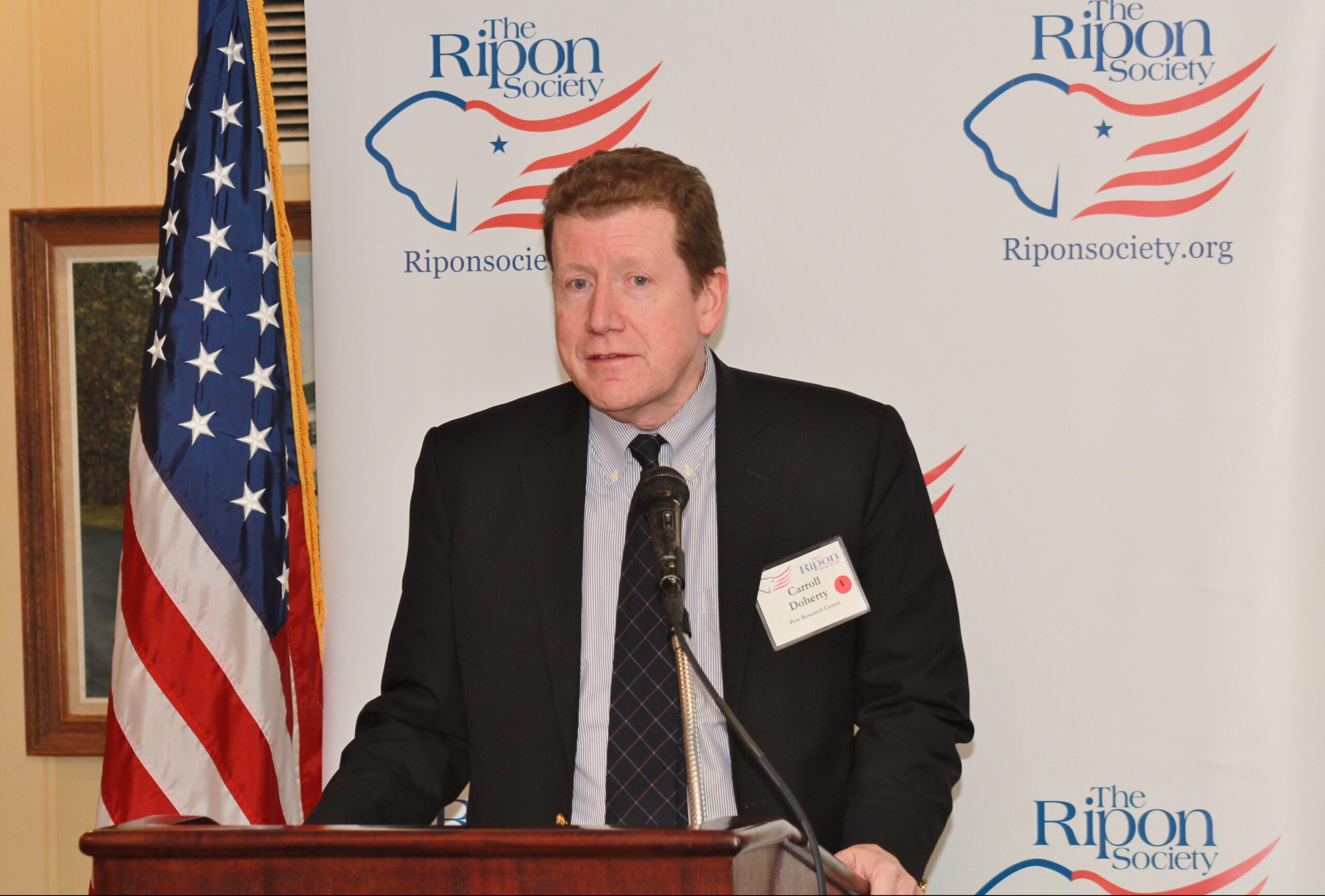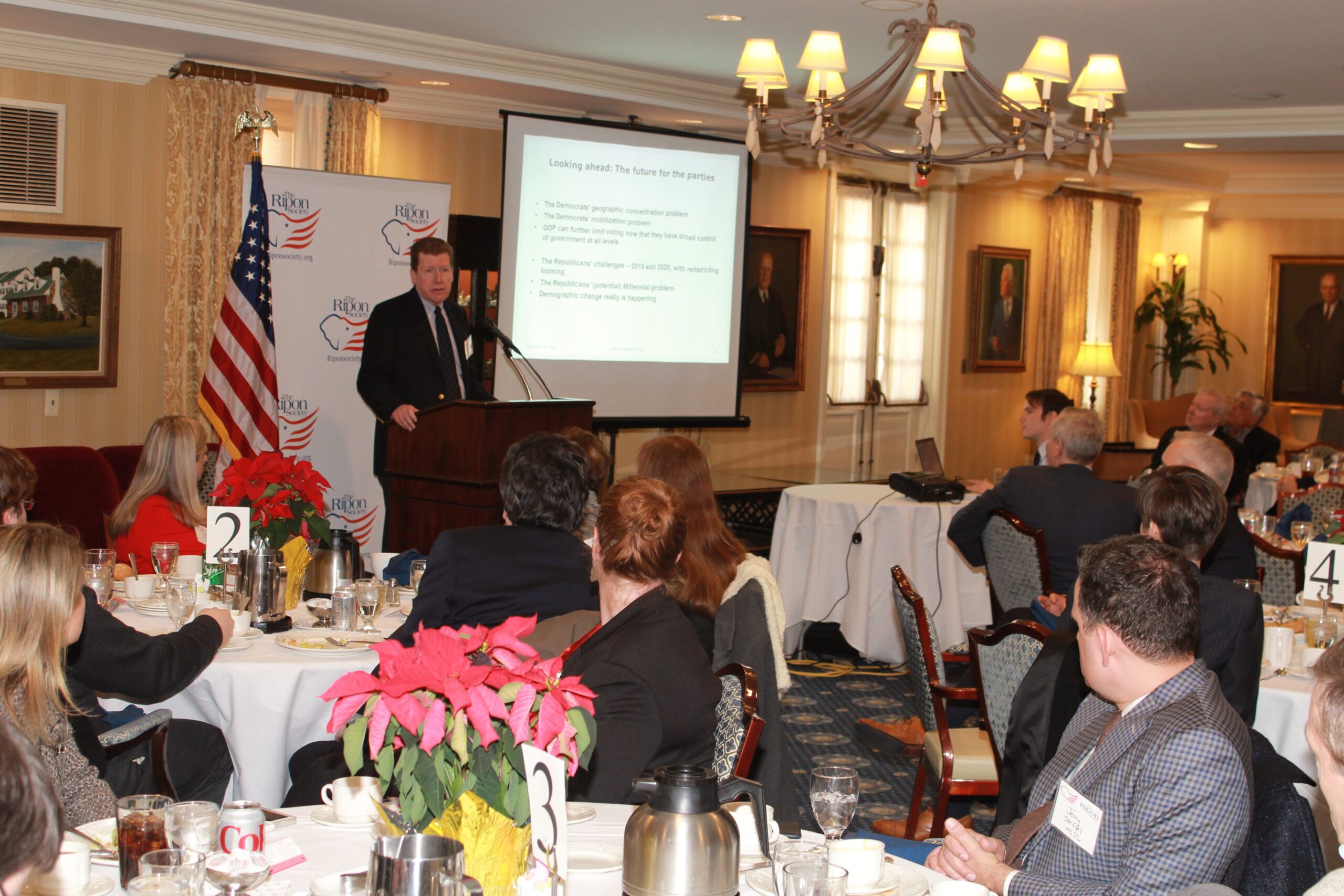 Pew Research Center Reports Surging GOP Optimism About the Nation’s Economy
Pew Research Center Reports Surging GOP Optimism About the Nation’s Economy
WASHINGTON, DC – Thirty-seven days after Donald Trump was elected President, The Ripon Society held a luncheon briefing that examined the nation’s political environment in the wake of his victory and found, among other things, that GOP optimism about the economy is surging heading into 2017.
The briefing, which was held this past Thursday, was led by Carroll Doherty, who serves as the Director of Political Research at Pew Research Center. Doherty opened his presentation by discussing the public’s increasingly partisan view of the presidential transition, and how the public has come to view some of the strengths — and weaknesses — of the President-elect.
“While the partisanship we now see in America long predates this election,” Doherty stated, “we’ve seen it really explode during this past campaign. At 79 percent among Republicans, the support for his transition is as high as it was for Bush in 2001 or Bush senior in 1989. No difference there. Where you do see a difference is in the out party,” where, Doherty noted, Trump’s transition plans have garnered only 15 percent support among Democrats.
“So what are Trump’s strengths?” Doherty continued. “We asked a question about confidence in his abilities to impact various realms. When it comes to working effectively with Congress, 60 percent of all Americans said they were at least somewhat confident of Trump in that realm. Where you see them not so confident is in handling international crises, using military force wisely, and preventing major scandals in his administration.”
When it comes to other positive attributes, Doherty reported that 60 percent of Americans view Trump as patriotic, while 52 percent say he is a strong leader. These positive attributes stand in contrast to the fact that 68 percent of Americans view Trump as being hard to like. This includes members of his own party. “Forty-nine percent of Republicans say he’s hard to like,” Doherty stated. “This is not somebody they have highly favorable views of on a personal level.” These unfavorables aside, Doherty added that, “Being seen as a strong leader and patriotic are clear assets for Trump among the Republican base.”
That said, there are times, Doherty added, when Americans want Trump to take a less confrontational and more cautious approach – particularly when it comes to his use of Twitter and some of the more outrageous comments he has made. “Universally, this is something that Republicans and Democrats can agree on. In fact, 76 percent of Republicans said, ‘Yes, you need to be more cautious once you take office.’
In addition to discussing where the public stands on the president-elect and presidential transition, Doherty also discussed where Americans stand on a number of key issues, including:
- Immigration – According to Doherty, 63 percent said that immigrants strengthen the country because of their hard work and talents, while 27 percent said they were a burden to the country because they take jobs, housing and health care.
- Health Care – when asked what Congress should do about the Affordable Care Act, Doherty reported that 76 percent of Republicans said it should be repealed, while 53 percent of Democrats would like to see it expanded.
- The Role of Government – In one of the more surprising findings, Doherty said that most white, non-college Republicans say that government doesn’t do too much for older people, but does too little — with 64 percent of respondents saying that government does not do enough.
- Trade – According to Doherty, GOP support for free trade agreements fell sharply during the campaign, with 68 percent of Republican and Republican-leaning voters saying that free trade agreements have been a bad thing for the U.S.
- The Economy – Doherty stated that optimism among Republicans is surging about the nation’s economy now that Trump has been elected, with 75 percent saying the economy will be better in a year.
“We haven’t seen anything like this,” Doherty remarked of the findings about the GOP’s soaring economic spirits. “On one hand, you have to say Trump has high expectations. But this is probably a pretty positive sign. People are thinking that he’s really going to change the economy — at least Republicans are.”

Following his presentation, Doherty answered a number of questions, including one about evangelical voters and how Trump, despite his personal flaws, was able to persuade them to support his campaign.
“I think the [Supreme] Court was a factor,” Doherty stated. “The possibility of Trump being able to nominate someone more acceptable to them on the Court… they overlooked a lot. They overlooked a lot of his personal foibles and flaws and voted at high rates — probably as high as in recent elections, maybe even a little bit higher. We’ll find out. They’re just such an integral part of the Republican base.”
Doherty was also asked about the state of modern polling in the wake of the election, and the perception that so many of the nation’s pollsters got it wrong.
“Look, perception is reality,” he stated. “And the perception is that the polls got it wrong and the media got it wrong. The truth is it’s more nuanced than that. It always is. It’s always more complicated. National polls were pretty much right. We did not do an election popular vote the way we typically do. We did not do that this year. We did our polling on issues, but we didn’t do basically a prediction.
“A couple of things happened. The national polls were generally okay. They weren’t bad. It was really the state polls. And what you had was a situation where these state polls and national polls were used to model the election more than we’ve ever seen. In other words, the New York Times, FiveThirtyEight, all had their predictors. All gave you a percentage, a single percentage, of the likelihood of the outcome. And a lot of that was based on, as we found later, faulty state polls, so it magnified the error in effect.
“Now, were some of the state polls wrong? Yeah, they were. And the most worrisome thing is that they might all be wrong in a certain direction, in the sense that the states that were most out-of-line were states like Wisconsin, where you have this high share of white, non-college voters. So the question arises — are polls systematically missing these voters? That’s an examination I think we’re all doing. We’re certainly leading that effort at my place. Is there a systematic under representation of these people in polls? Maybe they’re reluctant to participate for whatever reason. That was a factor as well. But I also think the idea of a false precision, of putting a percentage probability on the outcome, was kind of a mistake because it just magnified the errors at the end.”
Doherty also took a question about the public’s declining faith in government and whether President-elect Trump can reverse that trend.
“The question is a really good one because both sides are distrusting of government. It’s not necessarily that partisan of an issue. It’s a real problem for Congress and the administration — rebuilding this trust. Now, that being said, a healthy economy cures a lot of ills. And if this economy really does take off, I think you’ll see a little more faith in government.”
To view Doherty’s presentation slides before The Ripon Society on Thursday, please click here.
To view his remarks, please click on the link below:
The Ripon Society is a public policy organization that was founded in 1962 and takes its name from the town where the Republican Party was born in 1854 – Ripon, Wisconsin. One of the main goals of The Ripon Society is to promote the ideas and principles that have made America great and contributed to the GOP’s success. These ideas include keeping our nation secure, keeping taxes low and having a federal government that is smaller, smarter and more accountable to the people.



